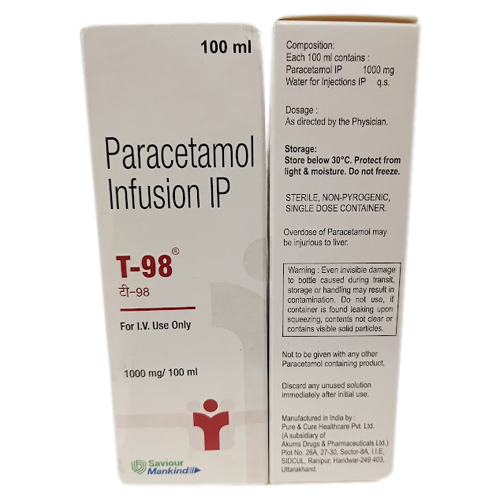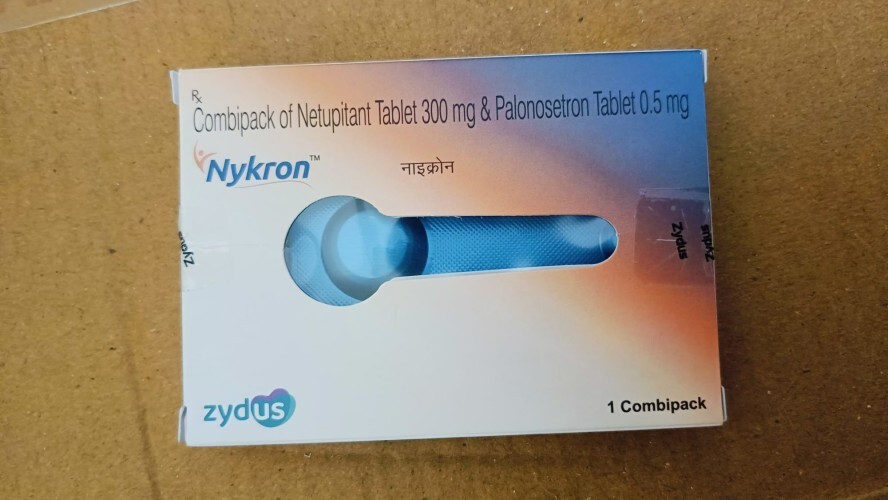Paracetamol Infusion IP
Product Details:
- Drug Type Injection
- Physical Form Liquid
- Dosage 100 ml
- Dosage Guidelines As per physician
- Storage Instructions Keep dry & cool place
- Click to View more
Paracetamol Infusion IP Price And Quantity
- 10 Vial
- 100 INR/Vial
Paracetamol Infusion IP Product Specifications
- 100 ml
- Keep dry & cool place
- Liquid
- Injection
- As per physician
Paracetamol Infusion IP Trade Information
- Cash Advance (CA) Cash in Advance (CID)
- 5000 Vial Per Month
- 7 Days
- Asia Australia Central America North America South America Eastern Europe Western Europe Middle East Africa
- Uttar Pradesh Karnataka Himachal Pradesh Tripura Maharashtra Central India Lakshadweep Telangana Mizoram Chandigarh Haryana Sikkim Andhra Pradesh Goa East India Punjab West India West Bengal Pondicherry Jharkhand Madhya Pradesh Andaman and Nicobar Islands Dadra and Nagar Haveli Chhattisgarh Delhi South India North India Meghalaya Manipur Kerala Tamil Nadu Gujarat Nagaland Uttarakhand Jammu and Kashmir Arunachal Pradesh Daman and Diu Bihar Assam Rajasthan Odisha All India
Product Description
Paracetamol infusion, also known as intravenous (IV) paracetamol, is a medication used to relieve pain and reduce fever. Paracetamol, also known as acetaminophen in some countries, is a commonly used over-the-counter medication. However, the intravenous form is typically reserved for situations where oral administration is not feasible or effective. Here's some information about paracetamol infusion IP 1000mg:
1. Indication Paracetamol infusion is indicated for the short-term treatment of moderate pain, such as post-operative pain, and for the treatment of fever in patients who are unable to take medications orally.
2. Mechanism of Action Paracetamol works by inhibiting the production of prostaglandins in the brain, which are chemicals involved in the perception of pain and regulation of body temperature. By reducing prostaglandin production, paracetamol helps to alleviate pain and lower fever.
3. Dosage Paracetamol infusion is typically administered intravenously over a period of 15 minutes to 2 hours, depending on the dosage and patient's condition. The usual dosage for adults is 1000mg (1 gram) every 6 hours, as needed for pain or fever.
4. Side Effects Common side effects of paracetamol infusion may include infusion site reactions (such as pain, redness, or swelling), nausea, vomiting, and headache. Serious side effects such as liver toxicity or allergic reactions are rare but possible.
5. Monitoring Patients receiving paracetamol infusion should be monitored regularly for any signs of adverse reactions or complications. Liver function tests may be conducted periodically to monitor for signs of liver toxicity, especially in patients receiving high doses or prolonged treatment.
6. Precautions and Contraindications Paracetamol infusion should be used with caution in patients with liver disease, alcoholism, or other conditions that may impair liver function. It is contraindicated in patients with a known allergy or hypersensitivity to paracetamol or any of the components of the formulation.
Paracetamol infusion is an important medication for the management of pain and fever, particularly in situations where oral administration is not feasible or effective. Its use should be guided by a healthcare professional based on the specific circumstances of the patient. As with any medication, it's essential to discuss the potential benefits and risks of paracetamol infusion with a healthcare provider before starting treatment.

Price:
- 50
- 100
- 200
- 250
- 500
- 1000+







 Contact Us
Contact Us Call Me Free
Call Me Free
